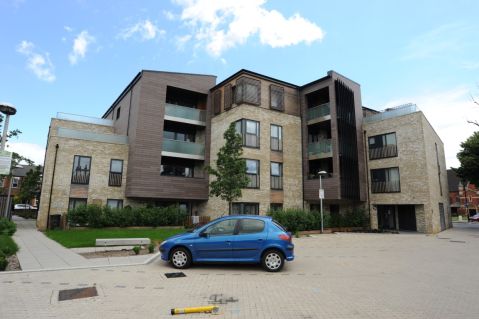About us
News & Publications
15th May 2025
Investing in Safe and Comfortable Homes - Our Commitment to You

At Karibu, your safety, comfort, and wellbeing are at the heart of everything we do.
That’s why we’re investing over £10 million across the next three years (2025-2028) which includes the £9.6 million illustrated below in addition to other ongoing annual works to upgrade and maintain the quality of our homes.
With the challenge of high energy costs, we want to make sure your home is as energy-efficient as possible. That’s why we’ve planned and budgeted for important improvements, such as new windows, doors, and heating systems.
These improvements are backed by a detailed Resident Safety Guide to help you keep your home safe and hazard-free. Together, our investment programme and your everyday actions play a vital role in protecting our communities.
Our Investment Programme (2025–2028)
Following a major stock condition survey in 2024/25, we have a clear, evidence-based plan for long-term investment.

Note: Residents whose homes are part of the 2025/26 programme will have received a letter in May 2025. If you do not receive a letter, your property will likely be included in a future year’s programme, with notification sent at the start of that financial year (before the end of May).
Resident Safety Guide
While we invest in improving the condition and safety of your home, it’s equally important that you stay informed about safety measures you can take as a resident. Here's what you can do to help keep your home safe.
Preventing Legionella: Run Your Taps Monthly
What is Legionella?
Legionella bacteria can form in stagnant water pipes and cause Legionnaires’ disease, a serious lung infection.
How to prevent it:
- Once a month, run all taps and showers in your home (bathroom, kitchen, utility).
- Let them run for at least 2 minutes at full temperature.
- Keep a safe distance to avoid inhaling any droplets.
- Clean taps and showerheads regularly to prevent limescale, which can harbour bacteria.
Warning signs:
If your water looks discoloured, smells strange, or the pressure is low, contact us immediately.
Smoke Alarm Maintenance: Test Monthly
Smoke alarms are your first line of defence in a fire. Don’t assume they’re working — test them!
How to test your alarm:
- Press and hold the test button until you hear a loud beep.
- If it doesn’t sound, it may need a battery replacement or a service call.
Keep alarms working properly:
- Vacuum the area around each alarm every few months to remove dust.
- Do not cover, paint over, or remove your alarms — this compromises your safety.
Where alarms should be installed:
- Hallways and landings
If you're unsure about alarm placement, get in touch and we’ll help check.
CO Alarm Maintenance: Test Monthly
CO alarms are your first line of defence to detect carbon monoxide. Don’t assume they’re working — test them!
How to test your alarm:
- Press and hold the test button until you hear a loud beep.
- If it doesn’t sound, it may need a battery replacement or a service call.
Keep alarms working properly:
- Vacuum the area around each alarm every few months to remove dust.
- Do not cover, paint over, or remove your alarms — this compromises your safety.
Where alarms should be installed:
- Close to any gas appliance
If you're unsure about alarm placement, get in touch and we’ll help check.
Gas & Electrical Safety Checks
These checks are legal requirements and help prevent gas leaks, fires, and electrocution risks.
Gas Safety Check – Every Year
We inspect:
- Boilers
- Gas pipes
- Gas-powered appliances (heaters, ovens)
What you need to do:
- Let us in on the scheduled day — it’s a legal requirement.
- Clear the space around your boiler before our engineers arrive.
- If you need to rearrange, let us know as soon as possible.
This check helps identify carbon monoxide risks and faulty components.
Electrical Safety Check – Every 5 Years
We check:
- Wiring and sockets
- Fuse boards and consumer units
- Earth bonding and overall safety compliance
What you need to do:
- Let us in on the scheduled day — it’s a legal requirement.
- Clear the space around your fuse box before our engineers arrive.
- If you need to rearrange, let us know as soon as possible.
After the visit:
You’ll receive a safety certificate, confirming your home’s systems are compliant and safe.
Damp & Mould: Prevention and Reporting
Why this matters:
Damp and mould can lead to serious health problems, particularly for children, the elderly, and people with respiratory conditions.
What causes damp?
- Condensation from cooking, drying clothes indoors, poor ventilation, and inadequate heating
- Leaks from plumbing, roofs, or windows
- Cold spots on walls and ceilings
- Excessive moisture within a home/room
How to reduce condensation:
- Use extractor fans or open windows when cooking or showering
- Keep lids on pans and close internal doors
- Dry clothes outdoors or use a vented dryer
- Leave trickle vents open (where available)
- Heat your home evenly, especially in colder months
- Wipe down windows when condensation appears
What to look for:
- Black spots on walls or ceilings
- Peeling paint or wallpaper
- Musty smell
What to do:
If you notice any signs of damp or mould, report it to us immediately. We will inspect the issue and, where needed, arrange remedial works.
We take damp and mould reports seriously. Early intervention helps us resolve the issue quickly and safeguard your health.
Compliance in Action
Our planned works and safety checks align with regulatory requirements like:
- Gas Safety Certificates (LGSR – Landlord Gas Safety Record)
- Electrical Installation Condition Reports (EICR)
- Fire Door Inspections
- Fire Risk Assessments
- Legionella Checks
- Lift Servicing & LOLER
- Asbestos Surveys (where applicable)
By staying compliant, we reduce risk and increase peace of mind for everyone.
Working Together for a Safer Home
At Karibu, we're committed to ensuring that every resident feels secure and cared for in their home. Our investment programme supports structural safety, and your awareness of everyday safety practices helps keep everyone protected.
If you have questions or want to know when your home will be part of the improvement programme, please get in touch — we’re here to help.
Tagged in:
